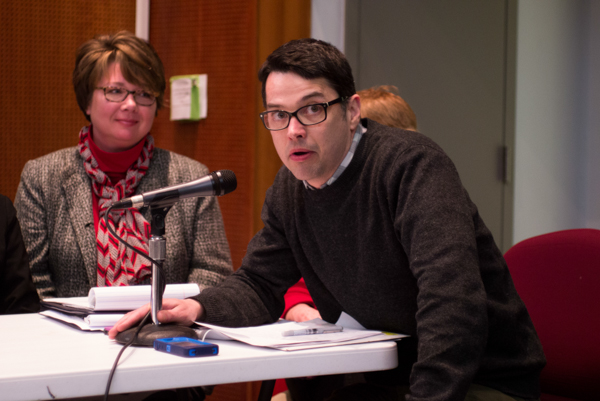

Public Education Now: Reform, Resistance, and Solutions in New York State, a panel discussion addressing current educational policies and their effects on students as well as educators and parents, was held on Wednesday, Feb. 19 in the Coykendall Science Building auditorium.
Eight people spoke at the forum starting with Leonie Haimson from Class Size Matters who spoke about InBloom Inc., defined as “an independent, non-profit organization whose mission is to provide a valuable resource to teachers, students and families to improve education,” according to its website. Haimson spoke about how the threat to student privacy and safety is a result of the new trend data sharing.
According to Haimson, New York State is the worst state in the country when it comes to data privacy.
“We need to reclaim public education for the public good, we need to create schools our children deserve… with the information available through data sharing, teachers tend to stereotype students before they’ve even met them,” Haimson said.
Karen Sprowal, a New York City parent of a fifth grader named Matthew, who requires special learning, spoke about her initial reaction after finding out all of the information that is readily available to third parties of his school.
“If you do some research you will be extremely surprised as I was. It’s like big brother on steroids,” Sprowal said.
Spowal’s son had an “educational neurological” evaluation, a 25-page-long document which was then scanned into records.
“For my son his school records are his medical records,” Spowal said.
The topic then moved on to the issue of the Common Core, a state standards initiative which is causing controversy throughout the state.
Bianca Tanis, a special education teacher and a mother herself, spoke of the negative impacts of implementing the Common Core. She felt that measures shouldn’t be taken unless the measures are solely for the benefit of students.
“Our struggling children are the canary in the coal mine,” she said. “No one knows what the outcome will be… we’ve always had standards.”
One of the main concerns about the Common Core is the idea that the best teachers will leave the profession. Because teachers can’t stop and take more time if the children aren’t quite grasping a concept — or stay on a certain subject because the students are so engaged in it — children with the highest needs are often the ones who struggle and fall behind according to Tanis.
Mike Lillus, a high school teacher, said the common core “really is an experiment on our children,” and called the tests given “developmentally inappropriate.”
Ken Mitchell, who came from the Lower Hudson Council of School Superintendents, said that Common Core narrowed curriculum and causes districts to have to cover unfunded costs leading to program and staff cuts
He added that 91 percent of superintendents thought they did not have enough money to comply with the Common Core and that 87 New York State districts reported being in fiscal stress.
Driving home the uncertainty of the Common Core, Mitchell quoted Bill Gates in the speech he gave to Harvard on the billions of dollars the Bill Gates Foundation put into education reform: “It would be great if our education stuff worked, but that we won’t know for probably a decade.”
